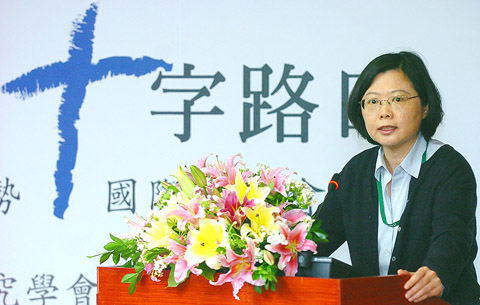Taiwan’s diplomacy is in jeopardy under President Ma Ying-jeou’s (馬英九) advocacy of a “diplomatic truce,” Democratic Progressive Party (DPP) Chairwoman Tsai Ing-wen (蔡英文) said yesterday, adding that the idea is tantamount to a unilateral disarmament of Taiwan.
“Taiwan’s isolation internationally is a result of China’s oppression. Ma, as the nation’s leader, should find a way to safeguard Taiwan’s international status and highlight the unreasonableness of China’s suppression,” Tsai said in a speech delivered at a forum on “Taiwan’s Security Policy under the New Administration” hosted by the Institute for Taiwan Defense and Strategic Studies.
“But instead, the new government is trying to negotiate with the country’s persecutor and to offer: ‘I won’t struggle. Don’t hit me,’” she said, referring to the modus vivendi approach put forth by Ma for dealing with China.

PHOTO: LIU HSIN-DE, TAIPEI TIMES
Tsai said that although the new government has only been in operation for less than 100 days, its national security policy is causing “worry, distrust and unease” among the people and is leading Taiwan toward a “dangerous state.”
She accused the Chinese Nationalist Party (KMT) government of being “narrow-minded” by believing that all the problems currently faced by Taiwan will be solved as long as relations with China improve.
As such a security policy must rely on Beijing’s goodwill in order to be successful, the government has already started making various concessions before China has even offered its terms and conditions, she said.
Besides the “diplomatic truce,” Tsai also described the KMT administration’s liberalization policy toward cross-strait economic and trade activities as “reckless.”
Tsai expressed displeasure at a recent statement by Chinese President Hu Jintao (胡錦濤) that “Taiwan stands great chances of winning medals as one of the home teams,” saying that the statement demonstrates China’s insincerity toward Taiwan.
Tung Chen-yuan (童振源), a professor on China’s political economy at National Chengchi University, and a panelist at the forum told the audience that Ma’s ambiguous approach on the issue of sovereignty is weakening the country’s national identity.
Citing examples, Tung said that while Ma insisted on the existence of the so-called “1992 consensus” — which says both sides of the Strait recognize there is only one China, but agree to differ on its definition — government and KMT officials never asked or challenged Chinese officials to state China’s view on its definition of “one China with different interpretation.”
Ma’s previous remarks saying that he would not mind if China’s Association for Relations Across the Taiwan Strait (ARATS) Chairman Chen Yunlin (陳雲林) addresses him as “Mr Ma” if he visits Taiwan later this year was another example of Ma not upholding Taiwan’s sovereignty, Tung said.
In addition, he said, Ma also advocates using the name “Chinese Taipei” for Taiwan’s bid to join various international organizations. Another panelist, June Dreyer, a professor of political science at the University of Miami, said the examples cited by Tung suggested Taiwan is weakening its own sovereignty.
“We can not see and touch sovereignty, but we can exercise sovereignty. If we do not exercise sovereignty, we are gradually losing it,” she said, adding that it seems that Ma has been showing goodwill to China, but China does not show any goodwill in return.

Nipah virus infection is to be officially listed as a category 5 notifiable infectious disease in Taiwan in March, while clinical treatment guidelines are being formulated, the Centers for Disease Control (CDC) said yesterday. With Nipah infections being reported in other countries and considering its relatively high fatality rate, the centers on Jan. 16 announced that it would be listed as a notifiable infectious disease to bolster the nation’s systematic early warning system and increase public awareness, the CDC said. Bangladesh reported four fatal cases last year in separate districts, with three linked to raw date palm sap consumption, CDC Epidemic Intelligence

The manufacture of the remaining 28 M1A2T Abrams tanks Taiwan purchased from the US has recently been completed, and they are expected to be delivered within the next one to two months, a source said yesterday. The Ministry of National Defense is arranging cargo ships to transport the tanks to Taiwan as soon as possible, said the source, who is familiar with the matter. The estimated arrival time ranges from late this month to early next month, the source said. The 28 Abrams tanks make up the third and final batch of a total of 108 tanks, valued at about NT$40.5 billion

Two Taiwanese prosecutors were questioned by Chinese security personnel at their hotel during a trip to China’s Henan Province this month, the Mainland Affairs Council (MAC) said yesterday. The officers had personal information on the prosecutors, including “when they were assigned to their posts, their work locations and job titles,” MAC Deputy Minister and spokesman Liang Wen-chieh (梁文傑) said. On top of asking about their agencies and positions, the officers also questioned the prosecutors about the Cross-Strait Joint Crime-Fighting and Judicial Mutual Assistance Agreement, a pact that serves as the framework for Taiwan-China cooperation on combating crime and providing judicial assistance, Liang

A group from the Taiwanese Designers in Australia association yesterday represented Taiwan at the Midsumma Pride March in Melbourne. The march, held in the St. Kilda suburb, is the city’s largest LGBTQIA+ parade and the flagship event of the annual Midsumma Festival. It attracted more than 45,000 spectators who supported the 400 groups and 10,000 marchers that participated this year, the association said. Taiwanese Designers said they organized a team to march for Taiwan this year, joining politicians, government agencies, professionals and community organizations in showing support for LGBTQIA+ people and diverse communities. As the first country in Asia to legalize same-sex